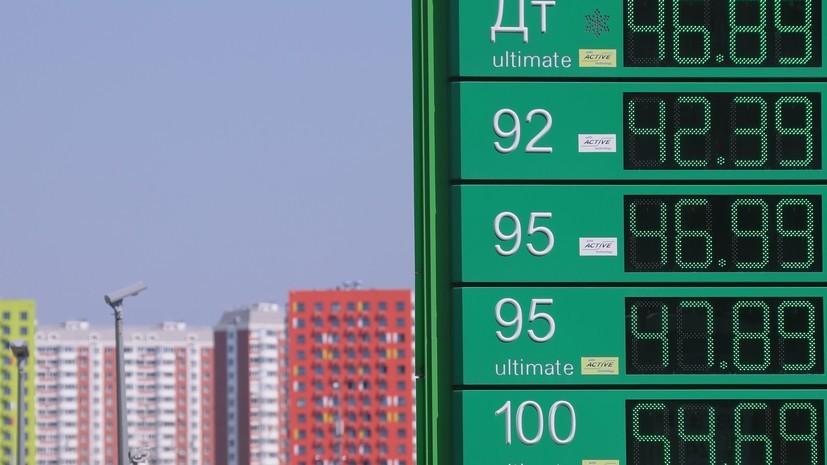In 2020, prices for AI-92 gasoline in Russia increased by about 2%.
This was announced on Monday, January 11, by Deputy Prime Minister Alexander Novak.
"The rise in prices for the 92nd gasoline in Russia in 2020 was about 2%, which is significantly lower than the inflation rate," TASS quotes the Deputy Prime Minister as saying.
According to Rosstat estimates, at the end of 2020, inflation in Russia was 4.9%.
At the same time, from January 9 to December 28, the cost of AI-92 fuel on average in the country increased by 2.2% (to 43.28 rubles per liter), prices for AI-95 fuel increased by 2.7% (to 47.04 rubles), and diesel fuel rose in price by 1.5% (to 48.74 rubles).
According to Alexander Novak, in 2021, the rate of rise in gasoline prices will continue to remain below inflation, which, according to the Central Bank's forecast, will be 3.5-4%.
The Deputy Prime Minister also added that the government and the Ministry of Energy keep the situation with fuel prices under special control in both the wholesale and retail markets.
At the same time, as Novak emphasized, the increase in the cost of fuel at Russian filling stations can be contained due to a special compensating mechanism - a damper.
Recall that after a sharp rise in fuel prices in 2018 (by 9.4%), the Russian government agreed with oil companies to freeze wholesale prices.
At the same time, it was not profitable for oilmen to supply fuel to the Russian market at a fixed cost.
Export prices significantly exceeded domestic prices, so it was more profitable for businesses to sell oil products only abroad.
As a result, from January 1, 2019, the state began to reimburse companies for lost income when supplying fuel to the domestic market.
Thus, if the prices for fuel within the country are lower than export prices, oil workers receive compensation from the budget.
At higher prices in the domestic market, companies, on the contrary, allocate part of their profits to the treasury.
Such a mechanism allows avoiding sharp jumps in the cost of fuel for consumers, Artyom Tuzov, executive director of the capital market department at Univer Capital, told RT.
“If, according to the results of monitoring, there is a sharp rise in the cost of fuel in some regions, then the competent authorities promptly carry out inspections and identify the reasons for the rise in prices.
Together with a damper, such a policy makes it possible to maintain a stable cost of fuel in the domestic market, ”added Tuzov.
RIA News
© Vitaly Belousov
Note that in the coming months, analysts predict an increase in wholesale prices for gasoline in Russia.
In many respects, experts explain this by the rise in oil prices on the world market.
So, since the beginning of 2021, quotations of raw materials of the Brent benchmark have grown by about 10% and are now in the range of $ 55-56 per barrel.
“Thanks to the rise in oil prices, it has become more profitable for producers to sell fuel for export again.
As a result, the supply on the domestic market is shrinking, and domestic fuel prices are starting to rise, "Dmitry Ivanov, executive director of the Klopenko Group, explained to RT.
So, on January 11, during the first trading in 2021, the wholesale price of AI-92 gasoline increased immediately by 4.2% - up to 49.6 thousand rubles per ton, and AI-95 fuel rose in price by 3.2%, to 50.7 thousand rubles per ton.
This is evidenced by the data of the St. Petersburg International Commodity and Raw Materials Exchange.
“The long holidays played a cruel joke on the wholesale producers: our traders went on vacation when the oil price was in the range of $ 51-52 per barrel, and now the figure is over $ 55.
As a result, the players were forced to quickly play back the changes, which led to an increase in the cost of fuel in the wholesale, "said Andrei Gordeev, an analyst at Virgin Oil Group, to RT.
Meanwhile, the observed growth in exchange prices is temporary, according to the specialists of the Ministry of Finance.
According to the ministry, the rise in fuel prices on the exchange will be able to be smoothed over within one to two months due to the action of the damping mechanism.
Moreover, as Andrei Gordeev noted, small independent companies with a low market share buy fuel on the exchanges, while the largest producers sell the bulk of their fuel.
Against this background, the dynamics of exchange prices for fuel in Russia has only a slight effect on the cost of gasoline in retail, the expert emphasized.
According to the chief analyst of the TeleTrade Group of Companies Pyotr Pushkaryov, regardless of oil prices, Russian fuel producers will not sharply raise fuel prices.
As the expert explained, otherwise, the authorities can reduce export quotas and thereby restrict the export of fuel abroad.
"For this reason, regardless of whether gasoline prices in Europe and Asia are high or low, in Russia, the rise in fuel prices will be approximately within the last year's 2% or 3%," Pushkarev said in a conversation with RT.

